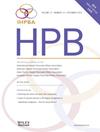肝内胆管癌肝切除术后手术复杂性和长期预后:一项多中心研究。
IF 2.4
3区 医学
Q2 GASTROENTEROLOGY & HEPATOLOGY
引用次数: 0
摘要
简介:肝内胆管癌(ICC)可侵犯周围结构,如下腔静脉或肝门,导致手术复杂性;然而,它对长期结果的影响仍然知之甚少。方法:回顾性分析2000年至2020年在三个三级肝胆中心连续行肝切除(LR)的ICC患者的数据。手术复杂性定义如下:I类;LR,第II类;胆道切除和胆道重建的LR和III级;LR伴大血管切除重建。结果:共入组303例患者,其中ⅰ级206例(68.0%),ⅱ级64例(21.1%),ⅲ级33例(10.9%)。I类、II类和III类患者的中位总生存期(OS)分别为57.6个月、31.0个月和17.5个月(P < 0.001)。在多变量分析中,III类与淋巴结转移和肿瘤多样性一起被确定为较差OS的独立预测因子;类I和类II不是独立的。结论:手术复杂性可能有助于对LR后ICC患者的生存结果进行分层。此外,III类患者的预后较差,因此需要对这些患者采取更精确的治疗策略。本文章由计算机程序翻译,如有差异,请以英文原文为准。
Surgical complexity and long-term outcomes after liver resection for intrahepatic cholangiocarcinoma: a multicenter study
Introduction
Intrahepatic cholangiocarcinoma (ICC) can invade surrounding structures such as inferior vena cava or hepatic hilum, leading to the surgical complexity; however, its effect on long-term outcomes remains poorly understood.
Methods
Data from consecutive patients with ICC who underwent liver resection (LR) between 2000 and 2020 at three tertiary hepatobiliary centers were retrospectively analyzed. Surgical complexity was defined as follows: Class I; LR, Class II; LR with biliary resection and reconstruction only, and Class III; LR with major vascular resection and reconstruction.
Results
A total of 303 patients were enrolled in this study, with 206 (68.0 %), 64 (21.1 %), and 33 (10.9 %) classified as Class I, Class II, and Class III, respectively. The median overall survival (OS) for Class I, Class II, and Class III was 57.6 months, 31.0 months, and 17.5 months, respectively (P < 0.001). On multivariate analysis, Class III was identified as an independent predictor of poorer OS together with lymph node metastasis and tumor multiplicity; Class I and Class II were not independent.
Conclusion
Surgical complexity may help stratify survival outcomes in patients with ICC after LR. Moreover, the poor prognosis associated with Class III highlights the requirement of a refined strategy for these patients.
求助全文
通过发布文献求助,成功后即可免费获取论文全文。
去求助
来源期刊

Hpb
GASTROENTEROLOGY & HEPATOLOGY-SURGERY
CiteScore
5.60
自引率
3.40%
发文量
244
审稿时长
57 days
期刊介绍:
HPB is an international forum for clinical, scientific and educational communication.
Twelve issues a year bring the reader leading articles, expert reviews, original articles, images, editorials, and reader correspondence encompassing all aspects of benign and malignant hepatobiliary disease and its management. HPB features relevant aspects of clinical and translational research and practice.
Specific areas of interest include HPB diseases encountered globally by clinical practitioners in this specialist field of gastrointestinal surgery. The journal addresses the challenges faced in the management of cancer involving the liver, biliary system and pancreas. While surgical oncology represents a large part of HPB practice, submission of manuscripts relating to liver and pancreas transplantation, the treatment of benign conditions such as acute and chronic pancreatitis, and those relating to hepatobiliary infection and inflammation are also welcomed. There will be a focus on developing a multidisciplinary approach to diagnosis and treatment with endoscopic and laparoscopic approaches, radiological interventions and surgical techniques being strongly represented. HPB welcomes submission of manuscripts in all these areas and in scientific focused research that has clear clinical relevance to HPB surgical practice.
HPB aims to help its readers - surgeons, physicians, radiologists and basic scientists - to develop their knowledge and practice. HPB will be of interest to specialists involved in the management of hepatobiliary and pancreatic disease however will also inform those working in related fields.
Abstracted and Indexed in:
MEDLINE®
EMBASE
PubMed
Science Citation Index Expanded
Academic Search (EBSCO)
HPB is owned by the International Hepato-Pancreato-Biliary Association (IHPBA) and is also the official Journal of the American Hepato-Pancreato-Biliary Association (AHPBA), the Asian-Pacific Hepato Pancreatic Biliary Association (A-PHPBA) and the European-African Hepato-Pancreatic Biliary Association (E-AHPBA).
 求助内容:
求助内容: 应助结果提醒方式:
应助结果提醒方式:


